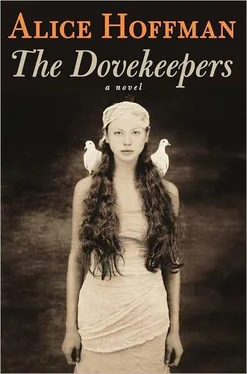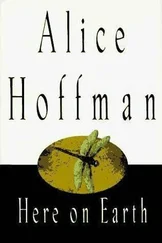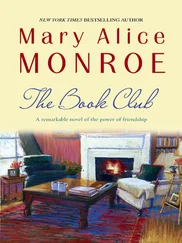Alice Hoffman - The Dovekeepers
Здесь есть возможность читать онлайн «Alice Hoffman - The Dovekeepers» весь текст электронной книги совершенно бесплатно (целиком полную версию без сокращений). В некоторых случаях можно слушать аудио, скачать через торрент в формате fb2 и присутствует краткое содержание. Год выпуска: 2011, ISBN: 2011, Жанр: Историческая проза, на английском языке. Описание произведения, (предисловие) а так же отзывы посетителей доступны на портале библиотеки ЛибКат.
- Название:The Dovekeepers
- Автор:
- Жанр:
- Год:2011
- ISBN:978-1-4516-1749-8
- Рейтинг книги:2.5 / 5. Голосов: 2
-
Избранное:Добавить в избранное
- Отзывы:
-
Ваша оценка:
- 60
- 1
- 2
- 3
- 4
- 5
The Dovekeepers: краткое содержание, описание и аннотация
Предлагаем к чтению аннотацию, описание, краткое содержание или предисловие (зависит от того, что написал сам автор книги «The Dovekeepers»). Если вы не нашли необходимую информацию о книге — напишите в комментариях, мы постараемся отыскать её.
The Dovekeepers — читать онлайн бесплатно полную книгу (весь текст) целиком
Ниже представлен текст книги, разбитый по страницам. Система сохранения места последней прочитанной страницы, позволяет с удобством читать онлайн бесплатно книгу «The Dovekeepers», без необходимости каждый раз заново искать на чём Вы остановились. Поставьте закладку, и сможете в любой момент перейти на страницу, на которой закончили чтение.
Интервал:
Закладка:
All the same, I was human. I longed for a lock of my mother’s hair so I might know its color. In that hallway I often wept for the comfort of her arms.
“Do you think I feel sorry for you?” my father demanded one day when he’d had enough of my wailing. “You probably killed her with your crying. You caused a flood and drowned her from the inside.”
I had never spoken back before, but I leapt up then. The thought that I might have drowned my mother with my own tears was too much to endure. My chest and throat burned hot. For that instant I didn’t care that the man before me was Yosef bar Elhanan and I was nothing.
“I wasn’t the one at fault,” I declared.
I saw a strange expression cross my father’s face. He took a step back.
“Are you saying I am the cause?” he remarked, throwing up his hands as though to protect himself from a curse.
I didn’t answer, but after he stormed out, I realized that we did indeed have something in common, more so than the scorpion and I, even if my father never spoke to me or called me by name. We had killed my mother together. And yet he wanted me to carry the blame alone. If that was what he wanted, then I would take on the mantle of guilt, for I was a dutiful daughter. But I would not weep again. Nothing could cause me to break this vow. When a wasp bit me and a red welt rose on my arm, I willed myself to be still and not feel its pain. My brother came running to make certain I hadn’t been harmed. He called me by the secret name he’d given me when we were little more than babies, Yaya. I loved to hear him call me that, for the pet name reminded me of the lullabies of my nursemaid and a time before I knew I’d brought ruin to my family.
I burned from the sting of the wasp but insisted I was fine. When I looked up, I saw the glimmer of tears in Amram’s eyes. Anyone would have thought he’d been the one who’d been wounded. He felt pain more easily than I and was far more sensitive. Sometimes I sang to him when he couldn’t fall asleep, offering the lullabies from Alexandria whose words I remembered, as if I’d once had another life.
* * *
ALL THE WHILE I was growing up I wondered what it might be like to have a father who wouldn’t turn away from the sight of me, one who told me I was beautiful, even though my hair flamed a strange red color and my skin was sprinkled with earth-toned flecks as though I’d been splattered with mud. I’d heard my father say to another man that these marks were specks of my mother’s blood. Afterward, I tried to pluck them out with my fingers, drawing blood from my own flesh, but my brother stopped me when he discovered the red-rimmed pockmarks on my arms and legs. He assured me the freckles were bits of ash that had fallen from the stars in the sky. Because of this I would always shine in the darkness. He would always be able to find me, no matter how far he might travel.
When I became a woman, I had no mother to tell me what to do with the blood that came with the moon or escort me to the mikvah, the ritual bath that would have cleansed me with a total immersion into purity. The first time I bled I thought I was dying until an old woman who was my neighbor took pity on me and told me the truth about women’s monthly cycles. I lowered my eyes as she spoke, shamed to be told such intimate details by a stranger, not quite believing her, wondering why our God would cause me to become unclean. Even now I think I might have been right to tremble in fear on the day that I first bled. Perhaps my becoming a woman was the end for me, for I had been born in blood and deserved to be taken from life in the same way.
I didn’t bother to ring my eyes with kohl or rub pomegranate oil onto my wrists. Flirtation was not something I practiced, nor did I think myself attractive. I didn’t perfume my hair but instead wound the plaits at the nape of my neck, then covered my head with a woolen shawl of the plainest fabric I could find. My father addressed me only when he summoned me to bring his meal or wash his garments. By then I had begun to realize what it was that he did when he slipped out to meet with his cohorts at night. He often wrapped a pale gray cloak around his shoulders, one that was said to have been woven from the strands of a spider’s web. I had touched the hem of the garment once. It was both sinister and beautiful, granting its wearer the ability to conceal himself. When my father went out, he disappeared, for he had the power to vanish while he was still before you.
I’d heard him called an assassin by our neighbors. I frowned and didn’t believe this, but the more I studied his comings and goings, the more I knew it to be true. He was part of a secret group, men who carried the curled dagger of the Sicarii, Zealots who hid sharp knives in their cloaks which they used to punish those who refused to fight Rome, especially the priests who accepted the legion’s sacrifices and their favor at the Temple. The assassins were ruthless, even I knew that. No one was safe from their wrath; other Zealots disowned them, objecting to their brutal methods. It was said that the Sicarii had taken the fight against Jews who bowed to Rome too far, and that Adonai, our great God, would never condone murder, especially of brother against brother. But the Jews were a divided brotherhood, already at odds in practice if not in prayer. Those who belonged to the Sicarii laughed at the notion that God desired anything other than for all men to be free. The price was of no consequence. Their goal was one ruler alone, no emperors, no kings, only the King of Creation. He alone would rule when they were done with their work on earth.
MY FATHER had been an assassin for so long that the men he had killed were like leaves on a willow tree, too many to count. Because he possessed a skill that few men had and claimed the power of invisibility, he could slip into a room as a shadow might, dispatching his enemy before his victim was even aware that a window had been opened or a door had closed.
To my sorrow, my brother followed our father’s path as soon as he was old enough to become a disciple of vengeance. Amram was dangerously susceptible to their violent ways, for in his purity he saw the world as either good or evil with no twilight space in between. I often spied them huddled together, my father speaking in my brother’s ear, teaching him the rules of murder. One day as I gathered Amram’s tunics and cloak to wash at the well I found a dagger, already rippled with a line of crimson. I would have wept had I been able, but I had forsaken tears. I would not drown another as I had drowned my own mother, from the inside out.
Still, I went in search of my brother, finding him in the market with his friends. Women alone were not often seen among the men who came to these narrow passageways; those who had no choice but to go out unaccompanied rushed to the Street of the Bakers or to the stalls that offered pottery and jugs made from Jerusalem clay, then, just as quickly, rushed home. I wore a veil and my cloak clasped tightly. There were zonnoth in the market, women who sold themselves for men’s pleasure and did not cover their arms or their hair. One mocked me as I ran past, her sullen face breaking into a grin when she spied me dashing through the alleyway. You think you’re any different than we are? she called. You’re only a woman, as we are.
I pulled my brother away from his friends so that we might stand beneath a flame tree. The red flowers gave off the scent of fire, and I thought this was an omen, that my brother would know fire. I worried over what would happen to him when night came and the Sicarii gathered under cedars where they made their plans. I begged him to renounce the violent ways he’d taken up, but my brother, young as he was, burned for justice and a new order where all men were equal.
Читать дальшеИнтервал:
Закладка:
Похожие книги на «The Dovekeepers»
Представляем Вашему вниманию похожие книги на «The Dovekeepers» списком для выбора. Мы отобрали схожую по названию и смыслу литературу в надежде предоставить читателям больше вариантов отыскать новые, интересные, ещё непрочитанные произведения.
Обсуждение, отзывы о книге «The Dovekeepers» и просто собственные мнения читателей. Оставьте ваши комментарии, напишите, что Вы думаете о произведении, его смысле или главных героях. Укажите что конкретно понравилось, а что нет, и почему Вы так считаете.












